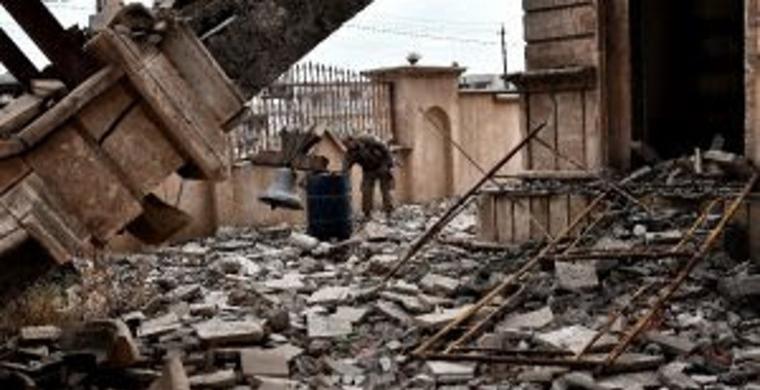A manifesto for the persecuted church
By George Carey
GLOBAL CHRISTIAN NEWS
http://www.globalchristiannews.org/article/a-manifesto-for-the-persecuted-church/
May 8, 2017
As the persecuted church agency Barnabas Fund presses British politicians to include religious freedom in their election campaign pledges the former Archbishop of Canterbury Lord Carey makes a plea to the next UK government.
I recently saw images of the hauntingly empty Iraqi town of Qaraqosh, near Mosul, which was taken by ISIS in 2014. It had a population of 50,000 mostly Assyrian Christians, but is now totally abandoned. The militants have used every means to erase the town of its Christian identity defiling and destroying its beautiful church buildings.
In August 2014, the militants swept through towns around Mosul and forced thousands to flee. Qaraqosh's Christians abandoned their homes and have still not returned, even though the town has now been liberated from IS.
I have always felt a particular connection with Iraq having spent my national service as a wireless operator in Basra and when I was there the Christian community was a sizeable proportion of the population -- living happily and peacefully alongside Shia and Sunni Muslims. But successive waves of persecution and violence are threatening to 'cleanse' Christianity not just from its heartlands in Iraq, Lebanon, Syria but from the whole of the Middle East.
It is only just over 100 years since the often forgotten Armenian genocide by the Ottomans wiped out millions of Middle-Eastern Christians. The world has been standing by while it happens again at the hands of ISIS and other groups linked to Al-Qaeda. The situation is similarly parlous in Northern Nigeria where Boko Haram -- notorious for abducting 296 Chibok schoolgirls -- has been conducting a systematic reign of terror and killing of Christian communities.
The persecuted church charity, Barnabas Fund, is urging politicians to put policies in their manifestos which will halt the genocide and violence against Christians worldwide.
"There is a very real danger," they point out that "Christian communities will have ceased to exist in large parts of the Middle East by the time of the next general election in 2022."
The next UK government's policy is hugely important. Politicians have promised much for years but have consistently failed to speak up and take action when Christians and churches have been attacked as they have in places as diverse as India, Eritrea, and Pakistan.
In fact, in some cases UK government policy discriminates against persecuted Christians. Just under 51 of the 2,592 refugees accepted for asylum in Britain between September 2015 and June 2016 were Christians -- less than two per cent of the total. The proportion dropped to just one per cent for the latest figures. Yet the pre-war Christian population of Syria was 10 per cent.
The government blatantly denies that its policies are biased against Christians, yet it has failed to give any satisfactory reason for why there is such a discrepancy in the numbers.
What is the reason for this shamefully slow response to Christian persecution? Christian minorities are the victims of our feelings of post-colonial guilt. We are so used to digesting a version of history which sits in judgement on the 'Christian Imperialism' of Europe during the past 500 years that we cannot accept a reverse narrative.
In turn the Christian communities in post-colonial Africa are often seen as the agents of that historic colonialism and wrongly resented for the sins of the past. In reality the imperialisms of history have been replaced by many other injustices and 'imperialisms'. For most of the last century atheistic communism was the major driving force behind global persecution of Christians. This still explains current persecution in China, and Laos for example, and accounts partly for the authoritarianism of Eritrea and North Korea.
But now radical Islam and the spread of sharia law and blasphemy law, is the driving force behind the persecution. So what can we do?
UK politicians should follow the policy advocated by groups like Barnabas Fund and get the Foreign and Commonwealth Office to do its job and start reporting to Parliament on what it believes to be the main causes of religious persecution and how to address them.
But I believe the next UK government should go further and cut its aid to countries where the persecution of Christians is aided and abetted by civil authorities.
The British government cannot stop religious persecution on its own, but it can provide leadership to the world by using the fullest extent of its diplomatic and economic power.
If, as the polls suggest, the Conservatives are likely to get a huge majority, I urge Theresa May to transcend the parochialism of narrow politics and regain a broad compassionate vision of working for minorities in parts of the world where radical Islam is so destructive. Brexit is, of course, important and getting the right deal is rightly the Prime Minister's central concern. But Britain has always been a wonderfully caring and generous nation and it is my hope that this will never change.
The Most Rev. George Carey is the former Archbishop of Canterbury














